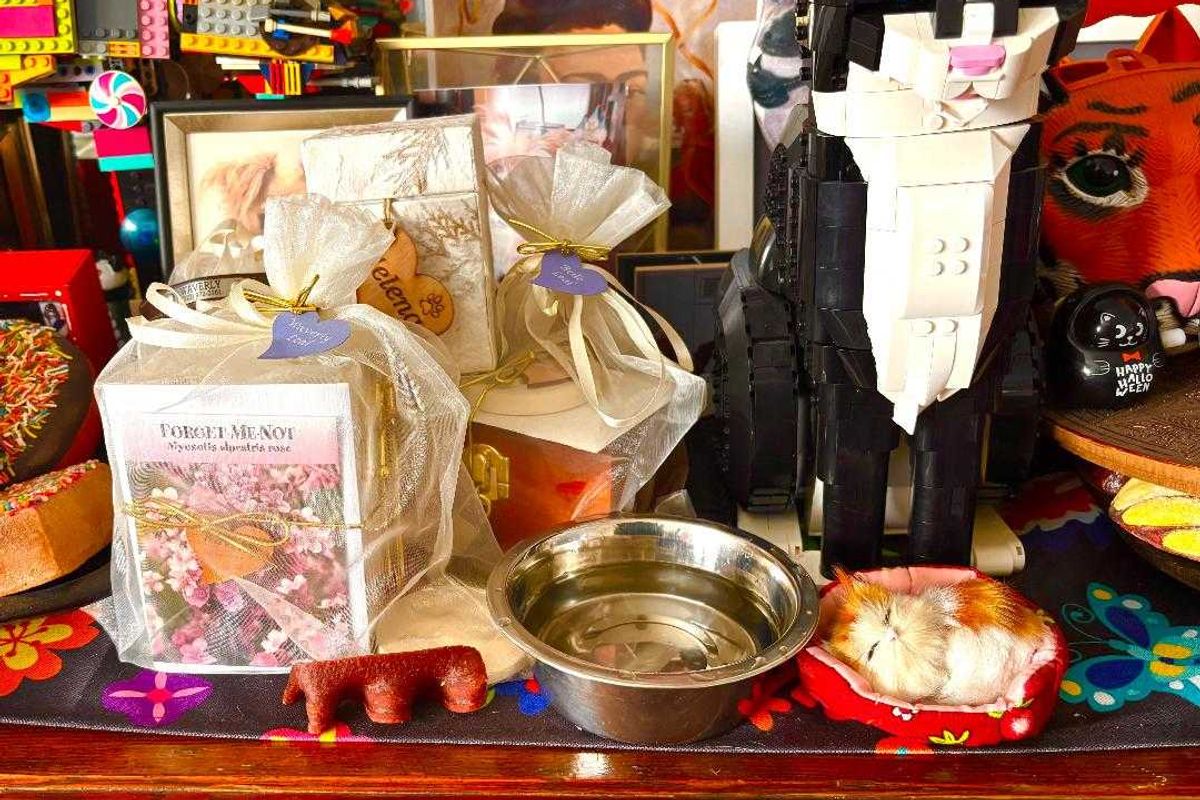People honor their four-legged friends on 'Day of the Dead for pets' and it's absolutely soul-stirring
"The rainbow bridge glows brighter than ever forming a gentle path of light."
Person makes his ofrenda to celebrate pets who have passed away.
Día de los Muertos, or Day of the Dead, has always been one of Mexico's most beautifully soulful traditions. On November 1st and 2nd, people honor their loved ones who have passed on from this life by setting up altars with "offerings" (or ofrendas) presenting a display of their favorite things. (For example, this year for my father, I will light a candle and display Oreos, a can of sardines, a Dodgers baseball playing card, and a Neil Diamond record.)
National Geographic Kids explains, "Day of the Dead combines the ancient Aztec custom of celebrating ancestors with All Souls' Day, a holiday that Spanish invaders brought to Mexico starting in the early 1500s."
It is a lovely offering and a wonderful way to not only remember our loved ones who are no longer here, but to open a symbolic portal to a space where, living or dead, we can all rejoice together—at least for a day.
October 27th was recently added as the Día de los Muertos specifically for pets who have crossed over that rainbow bridge. Dogs, cats, horses, rabbits, salamanders—no matter what the loved animal was, its soul matters too. In one heartwarming video, a person explains that the animals are the first to make the journey back to see us.
Reporter Nadia Cantú notes in the Milwaukee Journal Sentinel that, in 2019, it was a pet funeral home (Funeral Pet) who suggested pets have a designated day of remembrance. Many animal lovers took to the idea and have been setting up altars ever since (though many have been doing this for centuries).
If you'd like to take part, find a corner of your home that your pet especially loved to hang out in. This is where you can gather everything that represents this beloved pet on it's own ofrenda. Of course, the space can be shared with your offerings for human loved ones.
Cantú breaks down what different elements of this spiritual offering will do. Candles are key, she says, as "they represent the light that guides the soul back home."
Instagrammer @Finelythegoldenbear shares this lovely sentiment: "It's said that on this night the rainbow bridge glows brighter than ever forming a gentle path of light that stretches all the way to the hearts that miss them most."
Marigolds, often known in Spanish as cempasúchil, are also traditionally part of this offering. A piece in The Desert Botanical explains the meaning for this flower: "The celebration traces back to pre-Hispanic Aztec rituals tied to the goddess Mictecacihuatl, or the Lady of the Dead. The story goes that Mictecacihuatl allowed spirits to travel back to Earth to reconnect with their family members. The fragrance, which is a musky smell from marigolds, is said to lead souls from their burial place to their family homes. Throughout the years, this tradition adopted Roman Catholic aspects from Spaniards who conquered Mexico."
They also mention that other flowers, including "chrysanthemums, cockscombs, or gladiolas," are used in these altars, but marigolds—with their inviting warm color—are the most meaningful.
From there, one would put their pet's favorite, well, everything: food, treats, toys, or a bowl of water as a "symbol of purity and rest after their long spiritual journey." And of course, a photo of the pet (noting that if you don't have one, you can simply draw a picture or write their name).
My friend Larry Leal said of his altar, "There's ashes and pictures. And water because they are thirsty when they come. Plus, their favorite snacks!"
For my beautiful dogs making that trek across the bridge, I will put out blankets, their favorite squeaky toys, and, specifically for my beagle—a roll of toilet paper, as it was his favorite thing to eat.
Should you wish to celebrate, maybe take a stroll through the park on this day. Perhaps your wonderful pet, having made the long journey back to see you, might just be trotting right beside you.

